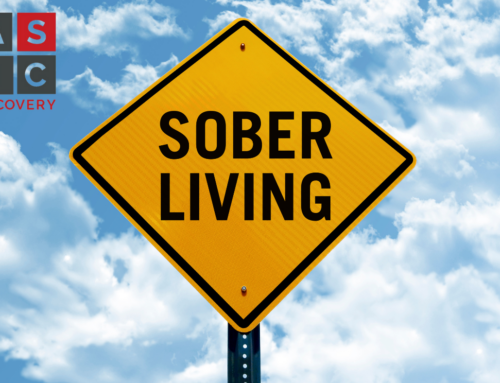Celebrate Recovery is a Christ-centered 12-step recovery program designed to help you overcome a wide range of difficulties in life, including:
- Substance use disorder (SUD)
- Codependency
- Sex addiction
- Eating disorders
- Grief
- Anger
- Physical, sexual, or emotional abuse
These are just a few of the most common reasons that someone comes into Celebrate Recovery, but really, it’s designed to help anyone suffering from any major issue in life by following a 12-step program rooted in Christian ideals, values, and teachings.
Because this program goes beyond the realm of substance abuse recovery, it’s necessarily more generalized, which is not necessarily a bad thing–it’s a holistic approach that acknowledges the interconnectedness of your physical, emotional, and spiritual well-being.
For many people suffering from substance use disorder, it can be helpful to go to a program where there are many people suffering from many different issues, especially if they have trouble identifying with others in Alcoholics Anonymous (AA) or another substance-centered fellowship.
This is because many people in these programs have had extreme consequences as a result of their addictions, which not everyone with SUD has experienced, whereas people who are suffering from other issues, like grief or food addiction, usually don’t have consequences that even approach the consequences SUD causes.
However, one portion of Celebrate Recovery, the “Open Share Group,” is when members meet in issue-specific groups so that they can connect with people who are suffering from the same problems.
This ensures that there’s both a time to connect with everyone and a time to connect with people who have a deep understanding of the exact issues you’re facing, giving you the best of both worlds.
The foundation of Celebrate Recovery is rooted in Christian principles and is almost always found in a church–that is, the church itself will manage the program to some degree, though they might give most, if not all, governing power to the members of the program.
However, this does mean that it’s a program centered on the teachings of the bible and the belief in the tenets of Christianity. It tends to be most helpful to people who are Christian or who believe in Christianity. For all others, non-secular programs like AA might be a better fit.
The Benefits of Celebrate Recovery
Possibly the biggest benefit of Celebrate Recovery is that it gives you access to an understanding community, encouraging you to connect with others who are on a similar journey and who have the same core religious beliefs as you do. Through this shared experience, you’re able to more deeply connect with people in your church in a way you might not be able to do otherwise.
It’s easy in a church setting for people who suffer from these types of issues to feel like they’re alone, and this is in fact a common reason people stop going to church–they feel like no one there understands what they’re going through or identifies with their struggles.
At Celebrate Recovery, you’re able to join a group of people in your church who have a deep understanding of what you’re going through, making it easier to stay involved in church and to get the benefits that come from regular church attendance and involvement.
The program also promotes self-awareness and personal growth. It empowers you to delve deep into your inner world, uncovering the root causes of your struggles. This introspection is instrumental in breaking the cycle of harmful behaviors and substituting them with positive coping mechanisms, allowing you to heal from whatever issues you’re dealing with.
Celebrate Recovery is also a very powerful tool for spiritual growth. It helps you to explore your spiritual beliefs; foster a deeper connection with God, Jesus Christ, and the Holy Spirit; and find relief and hope in your faith.
Here’s how Celebrate Recovery works.
The 3 Doors of Celebrate Recovery
The 3 doors of Celebrate Recovery are the three main groups or meetings that you can join whenever Celebrate Recovery takes place at your church.
The first door is the “Large Group Meeting,” which is very similar to what you’ll experience at the “regular” service. There will often be music and singing (worship), teachings (sermon), and testimonies from people who have recovered through Celebrate Recovery.
Worship is specifically designed to help people connect with or feel the power of the Holy Spirit
The second door is the “Open Share Group,” which takes place on the same night as the Large Group Meeting. This is where members of celebrate recovery break out into issue-specific groups so that they can connect more deeply with people who are experiencing similar issues.
This is so that people who may not feel like people with issues different from theirs will be able to connect with people whom they feel understand deeply what they’re going through. By attending both groups, you’re able to connect with a wide variety of people and find out where you fit best and feel most comfortable.
The third door is the “Step Study Group.” This group usually meets on a different night, often at a different time, and is focused on studying the 12 steps and the 8 principles to better learn how to take the steps (sometimes called “working the steps”) and implement the 8 principles in your life.
This is also a time to explore your “Hurts, Hang-ups, and Habits.”
Hurts are defined as the effects of what you’re suffering from and the aftermath of that experience, whether it be something you’ve done, something that’s been done to you, or something you’ve experienced.
Hang-ups are simply the unhealthy emotions or spiritual issues that are standing between you and a better relationship with God and Jesus Christ. This is a time to look at patterns that need to be broken.
Finally, Habits are the things that you do that are the major cause of your issues, which means your addiction, your substance of choice, or your compulsion/coping mechanisms–the things that are causing you the most trouble in your life.
The 8 Principles of Celebrate Recovery
The 8 principles of Celebrate Recovery are the pillars upon which your recovery journey is built. They come straight out of the Beatitudes and relate directly to many of the 12 steps. They were created by Pastor Rick Warren to help Christians take the 12 steps. The first letters of each word combine to form the word “RECOVERY”.
The 1st principle, “Realize,” is about acknowledging that you’re powerless over your struggles, that they make your life unmanageable, and that change is necessary (Step 1). “Happy are those who know that they are spiritually poor.” Matthew 5:3a
The 2nd principle, “Earnestly,” urges you to believe in the power of God to restore you to sanity (Step 2). “Happy are those who mourn, for they shall be comforted.” Matthew 5:4
The 3rd principle, “Consciously,” encourages you to make a decision to turn your will and your life over to Christ. “Happy are the meek.” Matthew 5:5a
The 4th principle, “Openly,” prompts you to examine yourself and confess your faults to God, to yourself, and to another person (Steps 4/5). “Happy are the pure in heart.” Matthew 5:8a
The 5th principle, “Voluntarily,” calls you to ask God to make the changes in your life that He feels are necessary and to submit to those changes (Steps 6/7). “Happy are those whose greatest desire is to do what God requires” Matthew 5:6a
The 6th principle, “Evaluate,” encourages you to look at all the harm you’ve caused in your relationships and to make amends where possible and where it won’t cause additional harm (Steps 8/9). “Happy are the merciful.” Matthew 5:7a, “Happy are the peacemakers” Matthew 5:9
The 7th principle, “Reserve,” asks you to spend time with God each day in prayer, examination of the Bible, and self-reflection to ensure you’re not getting off the beam (Steps 10/11).
The 8th principle, “Yield,” is where you actively spread the Good News to others (also known as Carrying the Message of Recovery) through both the example of your life and through your testimony (Step 12). “Happy are those who are persecuted because they do what God requires.” Matthew 5:10
How to Get Started with Celebrate Recovery
Getting started with Celebrate Recovery is a difficult-but-necessary step toward healing and personal growth. It’s about making a commitment to change, seeking help, and starting your recovery journey.
The first step is to find a Celebrate Recovery group near you. Not all churches will have a Celebrate Recovery program, but they’re much more common than you might think, especially in larger churches.
If you’re a member of a small church, you don’t have to worry about switching churches–it’s okay to find another church to go to Celebrate Recovery at while maintaining your membership at your current church.
Next, familiarize yourself with the 8 principles and the 12 steps of Celebrate Recovery. These are the guideposts for your recovery journey, providing a structured approach to healing and personal growth. You’ll have to implement these in your life if you decide to go through the process, so it’s a good idea to get a grasp on what’s required of you.
Finally, commit to the process. Recovery is not a destination, but a journey. It’s about progress, not perfection. Remember, you’re not alone in this journey. The Celebrate Recovery community is here to support and guide you every step of the way.
This usually means that you get a sponsor to help you go through the 12 steps.
What a Sponsor Is and How They Help
A sponsor is someone who has already gone through the 12 steps (specifically in Celebrate Recovery), is an active member of the group, has some significant sober time (usually 1 year or more), and is willing and able to help you go through those same steps.
Your sponsor is essentially your mentor through the program. While it’s possible to take the 12 steps mostly by yourself (except for Step 5), it’s generally not a good idea to do this.
There are a few reasons for this. First, if you try to do it by yourself, you need to have a high level of discipline and motivation. Essentially, you really need to be a self-starter. In reality, very few people, especially people suffering from substance use disorder, have these traits, especially if they’re still struggling with their addiction.
Second, a sponsor can help you stay accountable and honest in a way that’s very difficult to do by yourself. It’s fairly easy to make excuses, to believe your own lies or justifications, and to convince yourself that you’re doing well when you’re really not.
This is especially true if you’re still struggling to stop drinking and/or using. A sponsor is able to give you a clear, objective picture of what you’re actually doing, of whether your thinking is correct or off base so that you can more effectively work toward recovery.
Finally, a sponsor will ensure that you don’t make any mistakes while going through the process. The Big Book of Alcoholics Anonymous is like an instruction manual buried in a story. It can be difficult to pick out the exact instructions at times, and there are times when it’s a bit unclear or confusing. A sponsor ensures you understand exactly what to do.
It’s recommended that your sponsor be the same gender as yourself. They’re usually seen more as someone to simply guide you through the steps and not someone who should be giving you advice about how to live your life. However, many people find that they come to rely on their sponsor for counsel and are open to hearing what they have to say about the issues they’re struggling with.
Embracing Triumph with Celebrate Recovery
The path to recovery may be challenging, and the journey may be long, but Celebrate Recovery is designed to put you right in the center of a group of people who are actively working to better themselves through the teachings of Jesus Christ so that you can pair your faith with the same 12-step program that is a staple of most recovery programs.
If you’re going to Celebrate Recovery regularly and are thinking about getting into a sober living facility, partial hospitalization program, or an intensive outpatient program to augment your recovery, we can help.
At ASIC Recovery, our programs are dedicated to helping you develop healthier coping skills and build a supportive recovery network so that you can achieve long-term sobriety.
Click to learn more about our IOP, counseling, and sober living programs in Fort Worth, Texas.



